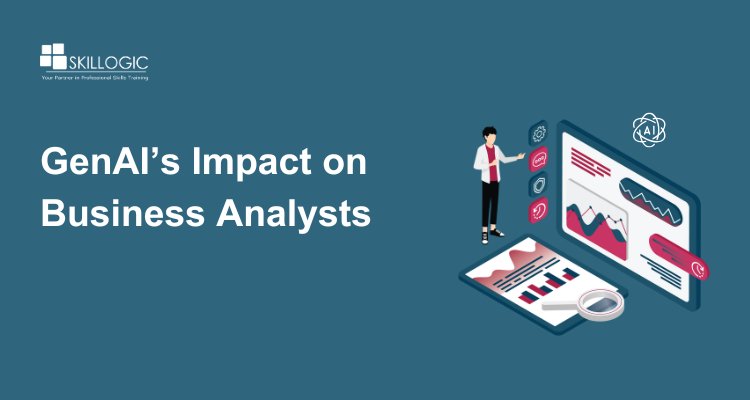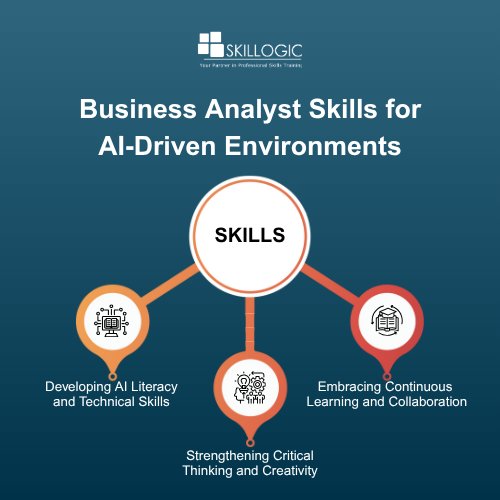How Generative AI is Reshaping the Business Analyst Role
Generative AI is transforming the business analyst role by enhancing data insights, automating tasks, and enabling smarter decision-making.

In today’s fast-paced digital economy, the role of the Business Analyst (BA) is more critical than ever. Serving as a bridge between organizational goals and technological capabilities, Business Analysts help drive efficiency, innovation, and growth. Now, the rise of Generative Artificial Intelligence (AI) is transforming this traditional role—changing how analysts gather insights, interact with stakeholders, and deliver strategic value.
Generative AI in Business Analysis introduces powerful new capabilities that go beyond automation. From generating reports to summarizing complex datasets, this technology is streamlining decision-making and reshaping business strategies. In this article, we’ll explore how Generative AI is redefining the analyst role, boosting productivity, and shaping the future of business analysis with AI.
AI-generated insights reduce human bias, highlight overlooked patterns, and improve forecast accuracy by 20-25% in pilot studies.
Understanding Generative AI
Generative Artificial Intelligence (AI) represents a cutting-edge branch of AI focused on creating new, original content rather than simply analyzing or categorizing existing data. Unlike traditional AI models, which typically excel at tasks such as classification, prediction, or pattern recognition, Generative AI goes a step further by producing entirely new outputs. These outputs can take various forms, including written text, images, audio, video, or even complex predictive models that simulate possible future scenarios.
A leading example is OpenAI’s GPT models, which can generate human-like language, compose code, and summarize complex information. These tools exemplify the impact of AI on business analyst role by enabling faster, more natural interaction with data and stakeholders.
The core technology behind Generative AI includes large language models (LLMs), transformers, and deep neural networks. These architectures allow AI to process and learn from massive datasets comprising text, images, or other data forms. By analyzing vast amounts of information, these models identify intricate patterns, language structures, and contextual nuances. This extensive training enables the AI to generate outputs that are not only syntactically correct but also semantically meaningful and context-aware.
In essence, Generative AI mimics aspects of human creativity and reasoning by synthesizing new content from learned data. This ability to create meaningful and original information opens up a wide array of applications—from automating content creation to enhancing decision-making and innovation in business environments.
Read More:
- Why Business Analysts Are the Secret Weapon of Start-ups
- The Future of Business Analysis in a Tech-Driven World
- Why Every E-commerce Company Needs a Business Analyst
Traditional Responsibilities of Business Analysts
Traditionally, business analysts focus on understanding business needs and translating them into actionable requirements for IT teams. Their responsibilities typically include:
Collecting and Analyzing Data
Business analysts gather quantitative and qualitative data from various sources, including customer feedback, market research, and internal systems. They analyze this data to identify trends, patterns, and areas for improvement, which helps organizations make informed decisions.
Documenting Business Requirements
A critical task is to clearly define and document business needs and functional requirements. Business Analysts translate stakeholder input into detailed specifications that guide IT teams and developers, ensuring that solutions meet business objectives and user expectations.
Facilitating Communication Between Stakeholders
Business analysts serve as connectors, translating objectives between stakeholders, IT teams, and leadership to ensure aligned outcomes. They ensure that everyone understands project goals, constraints, and progress, which helps prevent misunderstandings and aligns expectations across departments.
Supporting Project Management and Solution Validation
Business Analysts assist in planning and monitoring project progress, risk management, and resource allocation. They also validate that the developed solutions meet requirements by conducting tests, reviewing deliverables, and gathering user feedback.
Read More:
- How to become a Business Analyst in India?
- Business Analytics Scope in India
- How to Become a Business Analytics Expert in India?
Conducting Market and Competitor Analysis
To keep the business competitive, analysts research market trends, competitor strategies, and industry best practices. This insight helps in identifying opportunities for innovation and growth, guiding strategic planning efforts.
Wikipedia notes that Indian startups like Sarvam AI have attracted major investments, with Sarvam AI securing $41 million to develop large language models tailored to Indian languages.
Enhancing Business Analysis with AI Tools
One of the most significant shifts is how AI improves data handling. Enhancing business analysis with AI tools means more than speed—it’s about enhancing clarity, precision, and strategic decision-making.
Accelerating Data Interpretation
One of the most transformative impacts of Generative AI on business analysts is its ability to rapidly interpret complex datasets. AI can analyze structured and unstructured data, detect patterns, and generate summaries in plain language, making data more accessible to non-technical stakeholders.
Instead of manually sifting through spreadsheets, Business Analysts now use AI tools for business analysts to instantly surface insights, trends, and outliers — accelerating workflows and enhancing decision quality.
Automated Reporting and Insight Generation
Generative AI excels at automating routine tasks like creating business reports, dashboards, and executive summaries. By inputting raw data, Business Analysts can receive AI-generated narratives that explain the findings, highlight risks, or suggest opportunities. Automation minimizes manual mistakes while delivering consistent, data-backed reports.
AI-Powered Tools Transforming Data Analysis
Solutions like Tableau with AI extensions, Power BI with natural language support, and narrative generation software illustrate the power of AI for business analysts. These platforms simplify analysis, making it accessible even to non-technical stakeholders.
Markets and Markets projects the Generative AI market to soar from $71.36 billion in 2025 to $890.59 billion by 2032, growing at a CAGR of 43.7%.
Improving Requirements Gathering and Documentation
Exploring how Generative AI streamlines requirements gathering and automates documentation to enhance accuracy and collaboration.
AI-Driven Requirements Gathering
Gathering accurate and complete requirements is one of the most challenging phases in business analysis. Generative AI supports this process by analyzing stakeholder conversations, emails, and documents to identify key requirements, detect inconsistencies, and suggest clarifications.
Natural Language Processing (NLP) models can even generate initial drafts of requirements based on input from meetings or user stories, speeding up collaboration and reducing miscommunication.
Enhancing Stakeholder Communication
Effective communication is vital for successful project outcomes. AI-powered chatbots and virtual assistants can facilitate continuous engagement with stakeholders by answering queries, scheduling meetings, or collecting feedback in real-time. This ensures Business Analysts have up-to-date information while reducing administrative overhead.
Automated Documentation and Version Control
Documenting business requirements and changes is a repetitive but critical task. Generative AI tools can draft comprehensive documents, maintain version histories, and highlight changes over time. This helps business analysts keep documentation accurate and accessible, while focusing more on analysis and strategy.
Firms leveraging generative AI are seeing returns averaging 3.7x, with productivity gains between 15% and 30%, and targets reaching as high as 80%.
Read More:
- Business Analytics Training Fees in Coimbatore
- Business Analytics Course Fee in Chennai
- Business Analytics Course Fee in Kochi

Business Analyst Skills for AI-Driven Environments
To succeed in this evolving landscape, analysts must refine and expand their skillsets. Developing business analyst skills for AI is crucial to fully leverage the benefits of emerging technologies.
Developing AI Literacy and Technical Skills
As AI becomes integral to business analysis, Business Analysts must build foundational knowledge of AI concepts, tools, and data science basics. Understanding how Generative AI works enables analysts to better evaluate AI outputs, fine-tune models, and integrate AI insights into decision-making processes.
Many organizations now encourage Business Analysts to familiarize themselves with AI platforms, scripting languages like Python, and data visualization software to remain competitive.
Strengthening Critical Thinking and Creativity
Despite AI’s capabilities, human judgment remains irreplaceable. Business analysts need to sharpen their critical thinking skills to interpret AI-generated data thoughtfully and avoid blind reliance on automation. Creativity also plays a key role in designing innovative business solutions that AI alone cannot envision.
Embracing Continuous Learning and Collaboration
With AI transforming business roles rapidly, continuous upskilling is key. Business Analysts must engage in ongoing learning, attend AI-focused workshops, and collaborate with data scientists and IT professionals to ensure that AI tools for business analysts align with real-world business needs.
Generative AI is transforming the business analyst role by streamlining repetitive tasks, boosting data insights, and refining communication and documentation workflows. This technology empowers Business Analysts to focus on higher-value activities like strategic thinking, stakeholder engagement, and innovation.
The impact of AI on business analyst role is profound, but it’s not a replacement—it’s an augmentation. Analysts who develop the right skills, adopt the right tools, and maintain a balanced perspective will not only stay relevant but also lead the charge into the future of business analysis with AI.
By understanding and adapting to these changes, business analysts will not only future-proof their careers but also drive greater business impact in an increasingly data-driven world.
If you're looking to break into this rapidly growing field or elevate your current role, the right training can be a game-changer. Enrolling in a Business Analyst course in Coimbatore is a strategic step toward seizing opportunities in the evolving digital economy.
At SKILLOGIC, our Offline Business Analyst course in Coimbatore offers immersive, practical training guided by seasoned industry professionals, complemented by globally recognized certifications. With over ten years of experience serving key cities across India, SKILLOGIC equips learners with cutting-edge skills in business analytics, Six Sigma, PMP, cybersecurity, and cloud computing—preparing you to thrive in today’s rapidly evolving, technology-focused world. SKILLOGIC provides both online and offline training options across major locations including Bangalore, Hyderabad, Mumbai, Chennai, Pune, and Ahmedabad, ensuring flexible and accessible learning for aspiring professionals.

0
987